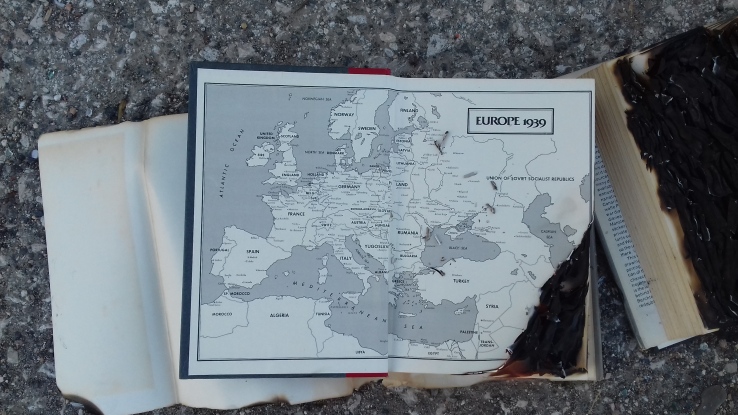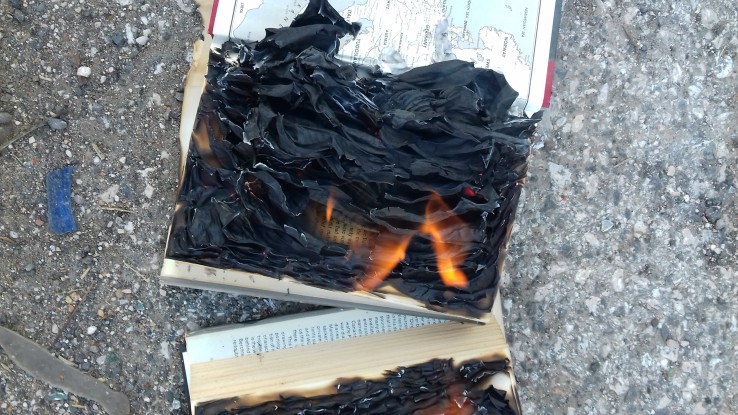
I wrote here two days ago that the cutting edge fashion in global fascism is to abandon climate denial and seek to co-opt concern for the environment rather than disdain it; Marine Le Pen, for example, no longer sees climate change as a Jew-led conspiracy but as a golden opportunity to push her agenda of global genocide. It’s since transpired that Italy is behind the French on this score. Although de facto Italian leader Matteo Salvini would no doubt approve of the means Brenton Tarrant used to put his beliefs into practice – the Australian fascist had the name of Salvini’s ally and ex-Lega candidate Luca Traini written on one of his guns – the terrorist’s self-description as an “eco-fascist” would seemingly cause Salvini some puzzlement, judging by the reaction of his supporters to the worldwide Climate Strike on Friday.
This article (in Italian) details the comments made by several pro-Salvini personaggi, some of them prominent in the Italian media, over the last few days. The writer and TV personality Maria Giovanna Maglie called for the Swedish teenage activist to be “mown down by a car”, while the former pop star Rita Pavone called her “a character from a horror movie”. Diego Fusaro, a political philosopher whose self-definition as a “Marxist” should be taken with un grandissimo pezzo di sale, accused the 16-year-old of being part of a plot by the “cosmopolitan elite” (hem hem). The well-known climate liar and founder of the daily newspaper ‘Il Foglio’, Giuliano Ferrara, tweeted “I don’t want to be accused of pedophobia, but I detest this idolatrous figure Greta and her disgusting braids, and the false world of lies she weaves round herself”. The hashtag #nogreta was trending among supporters of Salvini’s neofascist Lega party and its fellow travellers/coalition partners in the Five Star Movement, some of whom still, bizarrely, style themselves as environmentalists and even, in some outlandish cases, anti-racists. Salvini himself joined in with a typically puerile Trump-style tweet welcoming global warming as it will mean more “herbs”, a comment which will delight those among the Five Star Movement who aren’t in outright denial about Salvini’s being in power. A Five Star supporter I spoke to on Friday confirmed what I’d heard elsewhere, in that he felt that Salvini and the Lega “weren’t really” in control of the Government and that the self-confessed fan of Mussolini should be given “more time” to implement his agenda, which includes forcibly evicting and deporting hundreds of thousands of neri, protecting the Mafia by removing police protection from journalists who investigate them and building a European far-right alliance with Kaczynski, Orbán, Le Pen, and all those other names far too depressing to mention.
I’ve read* that those who voted for the electorally larger but politically junior element in his coalition (one of whom (although few people can remember whom) is nominally Prime Minister) pay little to no attention to ‘MSM’ accounts of what the Lega gets up to, putting their faith instead in the blog of their guru Beppe Grillo, a Pied Piper demagogue with a…colourful personal history**. Grillo has in the past blustered about climate change but in case anyone had their hopes up that his movement represents a progressive form of populism, also once proclaimed that “Anti-fascism is outside my purview” and tweeted that Rome is full of “swamped by rats, rubbish and illegal immigrants”. In a devastating article detailing Italy’s ‘descent into barbarism’, the universally respected journalist Roberto Saviano writes:
When people speak in general terms of populism in relation to this government they risk obscuring truly alarming facts on the ground with abstract political labels. There is no doubt that the blind eye this administration turns to racist attitudes has had serious consequences. Cynically the government gives a nod and a wink to extremist groups whose votes they do not want to lose.
The fact that Grillo’s blog has been called “the largest source of fake news in Europe” also helps explain why the Five Star Movement is far more committed to ensuring that kids aren’t protected from life-threatening diseases than it is to defending children who stand up for the environment from far-right death threats. At least it can’t be accused of incoerenza.

*The Lega/M5S Fascist/Moron coalition is a Rorschach blot, albeit with merda rather than ink. From that link: “The alliance between the Five Star party (the post-crisis ‘populists’) and the League (the xenophobic ‘populists’) is arguably functioning because of the borders around their electorates’ news sources. Occasionally I come across people who actively support both Five Star and the League. Far more common, however, are supporters of one party who are effectively ignorant of the policies of the other. For example, a Salvini supporter might rail on about how the closure of the ports will save Italian women from predatory Africans, but will have nothing to say about Five Star’s economic policies. On the other hand, a gloating Di Maio worshipper will happily praise the wonders of Five Star’s citizens’ income proposal or their anti-corruption stance, but will actively disassociate themselves from the League’s racism. And this is exactly the tactic of the separation of Ministerial powers: Di Maio, minister for jobs and welfare, makes no pronouncements about migration. But neither does his party. Search Five Star’s Facebook page, and you’ll find no mention of the Salvini law, as if it simply hasn’t happened. The same is true vice versa (with the exception of pension reforms, which the League takes as one of its central policies).”
**The M5S Party Line is that it was “ice on the road” that caused Grillo to crash his car and kill three people. That wasn’t the verdict of the court.









 I miss the days before Kindles and iPods, when you could get to know someone better by browsing through their book and music collections. Our Dutch friend Merel, at whose house we spend New Year’s Eve, has a good variety of recent fiction and books on sustainable development and the like. I’m a little taken aback to see on her shelves quite a range of books on dictators and fascism, including two by the disgraced Hitler apologist David Irving. Thankfully it turns out they belong to her landlord.
I miss the days before Kindles and iPods, when you could get to know someone better by browsing through their book and music collections. Our Dutch friend Merel, at whose house we spend New Year’s Eve, has a good variety of recent fiction and books on sustainable development and the like. I’m a little taken aback to see on her shelves quite a range of books on dictators and fascism, including two by the disgraced Hitler apologist David Irving. Thankfully it turns out they belong to her landlord.

 Someone in the Facebook group had suggested a far-off part of town crummy enough that few would be bothered by the sight of someone burning some books, but I didn’t really want to drag a one-week-old-baby across Rome and end up getting us both arrested for arson. Instead I thought of a largely abandoned area round the corner, next to the river, so I could get the whole thing out of the way in half an hour and not neglect my parental responsibilities. As it happens the area isn’t uninhabited; there’s a community of gypsies scattered along a stretch of the Tiber. Elsewhere on Facebook I read about the impending destruction of a similar settlement in Napoli, where my wife was born. The
Someone in the Facebook group had suggested a far-off part of town crummy enough that few would be bothered by the sight of someone burning some books, but I didn’t really want to drag a one-week-old-baby across Rome and end up getting us both arrested for arson. Instead I thought of a largely abandoned area round the corner, next to the river, so I could get the whole thing out of the way in half an hour and not neglect my parental responsibilities. As it happens the area isn’t uninhabited; there’s a community of gypsies scattered along a stretch of the Tiber. Elsewhere on Facebook I read about the impending destruction of a similar settlement in Napoli, where my wife was born. The 





